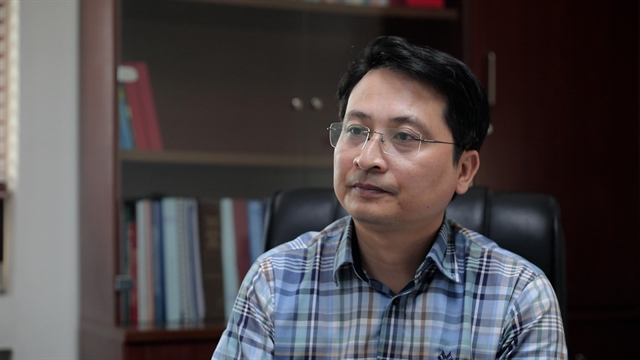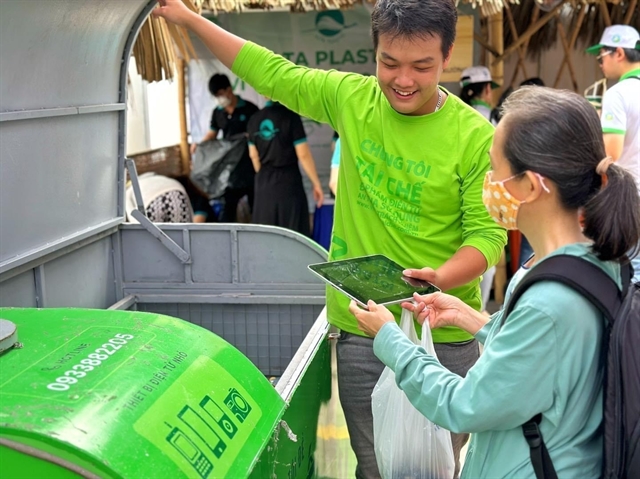 Economy
Economy


|
| Phan Tuấn Hùng, Director of the Department of Legal Affairs, Ministry of Natural Resources and Environment, cum Director of the Office of the National EPR Council. — VNS Photo Nhật Hồng |
Extended Producer Responsibility (EPR) is a new policy approach to deal with waste, promote recycling and help the Government achieve its environmental goals. It is expected to ensure the circulation of resources between the input and waste stages in the production process and help achieve the goal of zero emissions.
This is the first year of EPR implementation in Việt Nam, and the hope is to create a change in the process of promoting the circular economy. Phan Tuấn Hùng, Director of the Department of Legal Affairs, Ministry of Natural Resources and Environment, cum Director of the Office of the National EPR Council, spoke with Việt Nam News reporter Vũ Hoa about EPR implementation in Việt Nam.
In your opinion, how can Extended Producer Responsibility (EPR) contribute to environmental protection and sustainable development in Việt Nam?
EPR is an environmental approach where manufacturers and importers take responsibility for their packaging products even after they become waste. It serves as a tool and foundation for promoting a circular economy. In other countries, EPR plays a crucial role in shaping and developing the circular economy, as well as fostering a more advanced recycling industry. Additionally, it addresses the challenge of household solid waste management, particularly ocean plastic waste - a significant global issue, including in Việt Nam.
There are differing opinions regarding the impact of implementing EPR on commodity prices and potential difficulties for businesses. What is your stance on this matter?
Developing EPR policies may indeed raise commodity prices, I agree that introducing new responsibilities naturally comes with compliance costs. Nevertheless, I believe that proposing price increases might not be the wisest choice. If businesses opt to raise prices, they will face fierce competition from those that choose to enhance technology, redesign products and produce environmentally friendly alternatives. Therefore, a balanced consideration of price adjustments is essential.

|
| People in HCM City bring electronic waste to a recycling point. — VNA/VNS Photo Hồng Giang |
What other challenges do you think businesses may encounter when implementing EPR?
I also want to highlight the challenges that businesses face, particularly during the initial stages of EPR implementation. There are limitations in terms of design infrastructure, recycling infrastructure and the availability of recycling facilities in Việt Nam. These limitations pose significant obstacles.
I anticipate that the initial years may present some challenges. Nevertheless, I am confident that within the next three to five years, these challenges will no longer persist. This is attributed to our current awareness of numerous investors who are actively investing in the recycling sector, motivated by their understanding of this policy. Furthermore, foreign investors exhibit a particular interest in venturing into this field.
Currently, investor interest is heavily focused on green standards and the circular economy. What opportunities does EPR offer businesses that are committed to and pioneering its implementation?
EPR offers two distinct opportunities. Firstly, for manufacturers and importers, it provides a chance to share the responsibility and burden of waste management within the communities where they operate. Secondly, it serves as an opportunity for them to develop sustainable production and business models. I have personally encountered numerous large enterprises, especially foreign direct investment (FDI) companies, who view EPR as an opportunity to revamp their designs, adopt greener practices and ensure the sustainability of their products. This, in turn, garners consumer support.
For recyclers, this is an unprecedented opportunity in Việt Nam. They will not only focus on their production and business activities, but will also have an additional source of financial support stemming from EPR. However, it's important to note that not all recyclers will be able to benefit from this mechanism or financial support. Only those with sound infrastructure and a commitment to environmental protection, who rely on domestically sourced scrap instead of imported scrap, will be able to seize this significant opportunity.
What are the necessary preparation steps for importers, manufacturers and recyclers when implementing EPR?
Import manufacturers need to develop a specific business plan as EPR entails new responsibilities, which means there will be compliance costs. They should carefully plan their business operations and make informed decisions on how to fulfil these responsibilities. According to the current law, they have the option to either organise recycling themselves or contribute funds to the Việt Nam Environmental Protection Fund for financial support. If they choose to handle recycling internally, they must identify a recycling facility that possesses the necessary functions and qualifications to carry out the recycling process. Alternatively, they can choose to work with authorised recycling units, but this decision should be made from the outset. They can evaluate the economic viability and decide which approach is most suitable for their circumstances. It's important to note that the EPR policy aims to promote the recycling industry, and thus, recyclers stand to benefit from this mechanism. However, it is crucial to emphasise that eligible recyclers must meet environmental protection requirements and cannot use imported scrap in order to avail themselves of these preferential measures.
Although it has only been in operation for nearly three months, have there been any positive results for Việt Nam in implementing EPR?
Currently, EPR, as stipulated by the Law on Environmental Protection, encompasses two responsibilities: waste treatment and recycling of packaging products. The responsibility for waste treatment has been effective since January 1, 2022. With two years of implementation already passed, this being the third year, manufacturers and importers have made monetary contributions to the Việt Nam Environmental Protection Fund. By now, we may have accumulated a figure of more than VNĐ1 trillion to support waste collection and treatment in localities, as well as the collection and treatment of packaging from agricultural and pharmaceutical sectors. This is a significant resource that will assist us in waste management efforts in Việt Nam. This represents the first responsibility that has been put into effect.
The second responsibility, which is the responsibility for recycling packaging products, has only been in effect for approximately three months. Regarding this aspect, there is currently insufficient information to determine its effectiveness. However, we are noticing some positive developments. Initially, manufacturers and importers have started making changes in terms of product design, particularly packaging products. This is because if they introduce packaging that is difficult to recycle or not environmentally friendly, they will incur additional costs. This signals a shift that indicates future changes in the right direction.
In the near future, how will the Ministry of Natural Resources and Environment continue to support businesses in Việt Nam to implement EPR measures?
We have recently established a national EPR electronic information portal. Previously, importing manufacturers had to submit extensive paperwork containing a plethora of data, resulting in significant compliance costs. However, with the introduction of the national EPR electronic information portal, manufacturers and exporters can now register, declare and report through this platform, thereby reducing compliance costs and streamlining operations for businesses. This not only simplifies the declaration and reporting process, but also facilitates state management agencies like ours in data synthesis, monitoring and supervision of business activities.
Furthermore, we regularly conduct seminars, conferences, training sessions and consultations for businesses. Since the enactment of the Environmental Protection Law in 2022, we have organised numerous forums and seminars on the law for business associations and businesses. In 2024, we will continue to deploy these activities through various formats, including organising seminars in collaboration with business associations, providing direct assistance to businesses, addressing queries through online platforms, and hosting discussion sessions to address business concerns. — VNS




